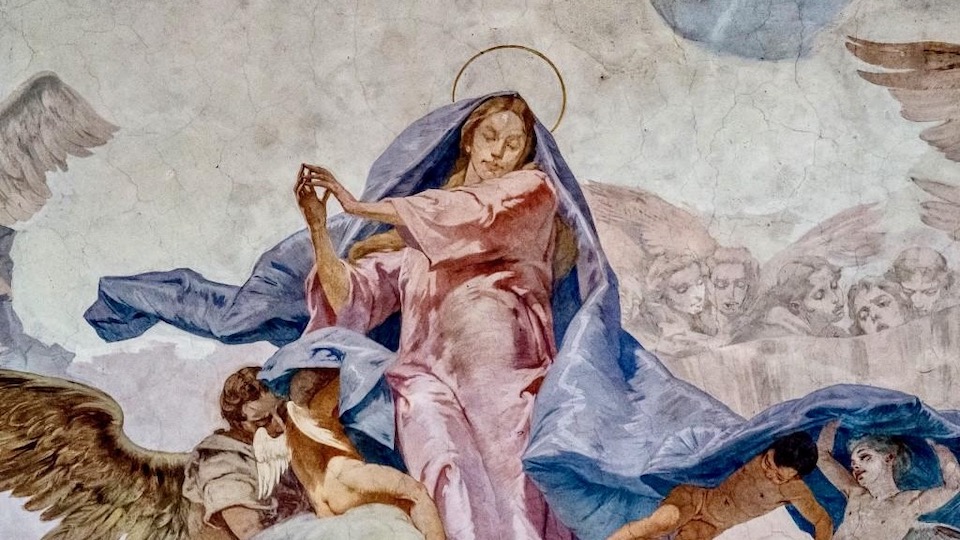

Pope Francis' Angelus Address for the Solemnity of the Assumption of the Blessed Virgin Mary
Pope Francis
Tuesday, August 15, 2023

On August 15, 2023, the Solemnity of the Assumption of the Blessed Virgin Mary, Pope Francis gave the customary address at the midday Angelus prayer. Read the full text of his address below:Dear brothers and sisters, buongiorno! Today, the Solemnity of the Assumption of the Virgin Mary, we contemplate her ascending in body and soul to the glory of Heaven. Today’s Gospel also presents her to us as she ascends, this time “into the hill country” (Luke 1:39). And why does she go up there? To help her cousin Elizabeth, and there she proclaims the joyful canticle of the Magnificat. Mary ascends and the Word of God reveals to us what characterizes us as she does so: service to her neighbour and praise to God. Both of these things: Mary is the woman of service to neighbour, and Mary is the woman who praises God. The evangelist Luke, moreover, narrates the life of Jesus himself as an ascent upwards, towards Jerusalem, the place of his self-giving on the cross; and he also describes Mary’s journey in the same way. Jesus and Mary, in short, travel the same road: two lives that ascend upwards, glorifying God and serving brethren. Jesus as the Redeemer, who gives his life for us, for our justification; Mary as the servant who goes to serve: two lives that conquer death and rise again; two lives whose secrets are service and praise. Let us look more closely at these two aspects: service and praise. Service. It is when we stoop to serve our brethren that we rise: it is love that elevates life. We go to serve our brothers and with this service, we “ascend.” But serving is not easy: Our Lady, who had just conceived, travels almost 150 kilometres from Nazareth to reach Elizabeth’s house. Helping is costly, to all of us! We always experience this in the fatigue, patience, and worries that taking care of others entails. Think, for example, of the kilometres that many people travel every day to and from work, and the many tasks they perform for others; think of the sacrifices of time and sleep in caring for a newborn or an elderly person; the effort in serving those who have nothing to offer in return, in the Church and in voluntary work. I admire voluntary work. It is tiring, but it is ascending upwards, it is reaching Heaven! This is true service. But service risks being barren without praise to God. Indeed, when Mary enters the home of her cousin, she praises the Lord. She does not talk about her weariness from the journey, but rather a song of jubilation springs from her heart. Because those who love God know praise. And today’s Gospel shows us “a cascade of praise": the child who leaps with joy in Elizabeth’s womb (cf. Luke 1:44); Elizabeth who utters words of blessing and “the first beatitude”: “Blessed is she who believed” (Luke 1:45); and everything culminates in Mary, who proclaims the Magnificat (cf. Luke 1:46-55). Praise increases joy. Praise is like a ladder: it leads hearts upwards. Praise raises souls and defeats the temptation to give up. Have you seen how boring people, those who live off gossip, are incapable of giving praise? Ask yourselves: am I capable of giving praise? How good it is to praise God every day, and others too! How good it is to live in gratitude and blessing instead of regrets and complaints, to raise our gaze upwards instead of wearing a long face! Complaints: there are people who lament every day. But see that God is near you, see that he has created you, see the things he has given you. Praise, praise! And this is spiritual health. Service and praise. Let us try to ask ourselves: do I live my work and daily occupations with a spirit of service, or with selfishness? Do I devote myself to someone feely, without seeking immediate advantages? In short, do I make service the “springboard” of my life? And thinking about praise: do I, like Mary, exult in God (cf. Luke 1:47)? Do I pray, blessing the Lord? And, after praising him, do I spread his joy among the people I meet? Each one of you, try to answer these questions. May our Mother, assumed into Heaven, help us to climb higher each day through service and praise. ____________________________________________________ After praying the Angelus, the Holy Father continued: Dear brothers and sisters, Today, we entrust to Mary assumed into Heaven our supplication for peace in Ukraine and in all war-torn regions: there are so many of them, unfortunately. The clamour of weapons drowns out attempts at dialogue; the law of force prevails over the force of law. But let us not be discouraged, let us continue to hope and to pray, because it is God, it is He who guides history. May He listen to us! Text courtesy of Libreria Editrice Vaticana
Related Articles:
Category: Pope Francis
Tag: angelus, Angelus Address, Assumption, Assumption of Mary, Assumption of the Blessed Virgin Mary, Pope Francis, Pope Francis Angelus
Pope Francis’ Catechesis – April 9, 2025
Wednesday, April 9, 2025
 Pope Francis
Pope Francis
Pope Francis continued the second section of his cycle of catechesis on "Jesus Christ our Hope," as part of the Jubilee 2025, on encounters with Christ in the Gospels. This week, he reflected on Jesus' encounter with a rich man in the Gospel of Mark, chapter 10.
Pray with Pope Francis Reflection – April 2025
Tuesday, April 8, 2025
 Fr. Edmund Lo, SJ
Fr. Edmund Lo, SJ
In this month of April, Pope Francis invites us to pray for the use of new technologies, that they will not replace human relationships, will respect the dignity of the person, and will help us face the crises of our times.
Pope Francis’ Prayer Intention for April 2025
Thursday, April 3, 2025
 Pope Francis
Pope Francis
We join the Holy Father in praying that the use of the new technologies will not replace human relationships, will respect the dignity of the person, and will help us face the crises of our times.
Pope Francis’ Catechesis – April 2, 2025
Wednesday, April 2, 2025
 Pope Francis
Pope Francis
Pope Francis continued the second section of his cycle of catechesis on "Jesus Christ our Hope," as part of the Jubilee 2025, on encounters with Christ in the Gospels. This week, he reflected on Zacchaeus' practical efforts to encounter Jesus, writing that "When you have a strong desire, you do not lose heart. You find a solution. Zacchaeus, just like a child, climbs a tree."
Pope Francis’ Catechesis – March 26, 2025
Wednesday, March 26, 2025
 Pope Francis
Pope Francis
Pope Francis continued the second section of his cycle of catechesis on "Jesus Christ our Hope," as part of the Jubilee 2025, on encounters with Christ in the Gospels. This week, he reflected on Jesus' encounter with the Samaritan woman at the well, saying that "Jesus waits for us and lets Himself be found precisely when we think that there is no hope left for us."
SUPPORT LABEL
$50
$100
$150
$250
OTHER AMOUNT
DONATE










